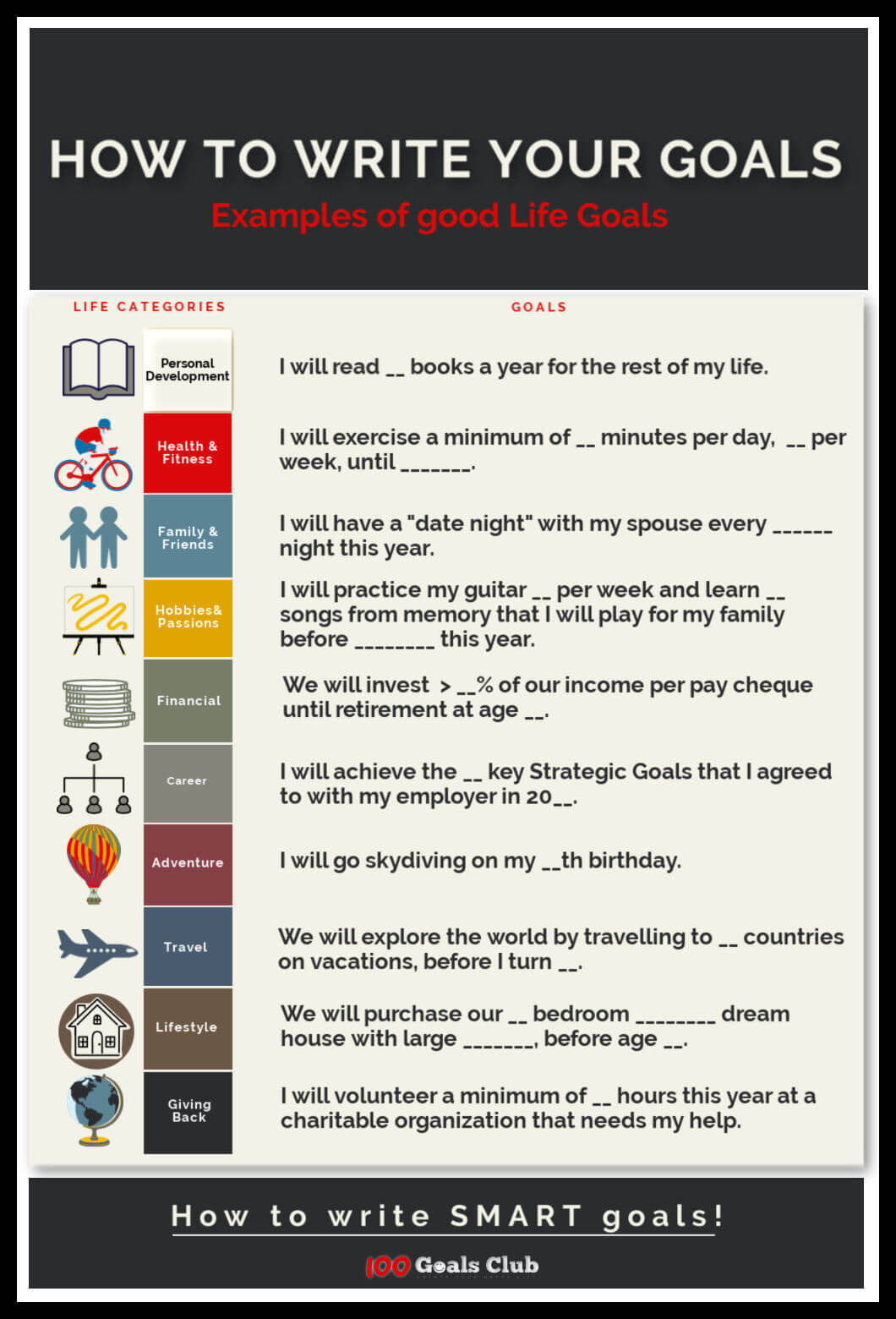How to write a goal to achieve results!
Learning how to write a goal is the first important step in the goal setting process. There are good ways and bad ways to write goals.
Your odds of completing your goals go way up once you make the commitment to write them down. When written correctly, they go up even higher.
At the 100 Goals Club, the goals focused on are life goals. The steps in how to write a goal applies equally to goals in all areas of your life, whether personal goals, career goals or in any of the 10 life goal categories featured on this site:
5 key points on how to write a goal
The following are some basic guidelines for writing down a goal:
- Goals should be written using the world recognized SMART format (see below).
- You can hand-write or type your goals out. Hand writing your goals may create more of a personal connection to them. But typing them is fine too. I use a combination of both hand-written and typed.
- For important goals like life goals, pick a date by which you will "finalize" your written goal. It is good to write your goals in draft mode first and give them sufficient review time to sink in, before you make the firm commitment.
- The bigger your goals, the more of an emotional connection you need to have with them. Only write down goals that you really want to achieve and are committed to.
- Goals need to be reviewed frequently and front of mind. Consider posting them on your wall, on your bathroom mirror, in your office, in your car and any other place you will see them. Look at them every day!

SMART Goals
SMART goal setting starts with understanding the "SMART" acronym:
S - Specific
M - Measurable
A - Attainable
R - Relevant
T - Timebound
Each of these is detailed below:
SPECIFIC
Be very specific about your goals. The following table illustrates a poorly written goal that is not specific, and a well written goal that is.
|
Poorly Written Non-Specific Goal |
Well Written Specific Goal |
|
I want to lose weight |
I will achieve my optimal body weight of 160 lbs before my Xth birthday. |
|
I will travel the world |
I will travel to a major city on each continent before I turn 50. |
|
I want to get in shape |
I will be able to do 50 push-ups and run a mile without stopping, by May 1, 2023. |
|
I want to make more money |
I will increase my income by $ 5,000 within the next year by Dec 31, 2022. |
MEASURABLE
Goals need to be measurable in terms of knowing whether or not you have achieved your goal or not. A goal that says “I want to lose weight” is not measurable. A goal to lose a total of 25 lbs is.
ATTAINABLE
Your “Target” goals need to be attainable. Your “Outrageous” goals do not. Select Target Goals that any reasonable person, specifically you, will say that with dedicated effort and time, the goal is an attainable goal given your current circumstances in life.
If you currently have a 65% average in your Senior year of High School and want to go to University to be a Veterinarian or a Doctor, its not realistic to think you could attain that goal due to the high entrance averages required for these programs, typically 90%+.
As an outrageous goal however, if you are passionate about this, definitely write it down.
RELEVANT
Smart goal setting needs to be relevant to your life. To use the above example of being a Doctor, if you currently have very little interest in the medical field and want to be a Doctor because of the high-income potential or your parents wanting this for you, I would suggest to you this goal is not relevant to who you are as a person.
Choose goals that are relevant to you and the life you want to live.
TIME BOUND
The time component of SMART goal setting is to be time specific by saying when you will accomplish your goal.
In setting Life Goals, because of the longer-term nature of these goals, the aspect of time achievement will likely be longer term than if you were establishing goals with a shorter horizon. It is best to establish goals which are a balance of short, medium and long-term goals.
If all your goals can be accomplished within the next year then you are setting your goals too easy. If they will all take a “lifetime” to achieve, then they’re too difficult.
This guide will help you set goals which are a balance of goals you will accomplish within the next year, 5 years, 10 years and within your lifetime.
Goals need a timeline to create a sense of urgency to get them done. Without a firm due date that you commit to, your goals will drift.
You don’t need to worry about doing this for all 100 Goals right now. Pick the most important top 5, 10 or 20 that you will be serious about achieving and give them firm due dates.
Some of the goals you set will have a recurring time frame, meaning that you want to commit to achieving them annually or each decade.
Check out the following poster for how to write a goal . . .
More examples of how to write a goal
The following goals are examples of how to write a goal:
PERSONAL DEVELOPMENT GOALS
- I will read 10 self-help books by end end of this year
- I will attend at least 1 success workshop annually
- I will develop the habit of a power hour and practice it 5X per week, starting _______
- I will find a mentor / coach before the end of this year
- I will develop 3 positive affirmations and repeat daily
- I will join Toastmaster and obtain the 1st level of mastery within 2 years
- I will learn how to write a goal
HEALTH AND FITNESS GOALS
- I will develop my list of health principles and stick to them 5 days / week
- I will reach and maintain my ideal body weight of X lbs for 1 year
- I will exercise hard for 30 minutes, 5X per week, for 1 year
- I will lift weights a minimum of 1X/week for one year
- I will take martial arts lessons weekly for 1 year
- I will live healthy (no major disease) to the age 80
FRIEND AND FAMILY GOALS
- I will develop and maintain close relationships with 3 good friends before I turn 30
- I will find and marry my ideal partner before I turn 30
- We will establish a date night, once a week/month
- I will spend 1 hour a day with my children, distraction free, 3 days/week
- My family has regular monthly family meetings, once per month, for life
FINANCIAL GOALS
- I will develop and use a system for tracking my cash flow and maintain monthly, starting 3 months from now
- I will develop a credit score of __ or above and maintain it
- I will put 10% of each pay into an appreciating asset account starting next month
- I will find your financial mentor or adviser, meet with them a minimum of once a year
- I will buy a rental property within the next 12 months
- I will increase my income by 15-20% within 3 years
- I will develop a comprehensive plan for your retirement by the time I turn 40
CAREER GOALS
- I will get a formal education by the time I turn 25 by attending _______ program
- I will join a professional organization, ________, this year
- I will get a promotion to the position of __________, within 2 years.
- I will develop a second source of non-salaried income of at least 10,000/annum before I turn 35
ADVENTURE GOALS
- I will plan and take a 1 week driving vacation across my country before I turn 40
- I will go on a 3-day camping trip in a national park next year
- I will plan and take an air adventure in Maui in 2023.
- I will climb a mountain in South America before I turn 60
TRAVEL GOALS
- I will visit the top 5 local attractions nearest to where I live within the next 2 years
- I will travel to and explore the top 10 attractions or places in my country within the next 5 years
- I will visit one of the 7 wonders of the world, every decade
- I will take a cruise ship mediterranean vacation on my 40th birthday
- I will vacation in an amazing entertainment city, New York, within the next 5 years.
LIFESTYLE GOALS
- We will dine out at a good restaurant once a month
- We will take 2 weekend getaways per year to a charming town within a 2 hour radius
- We will buy a 3 bedroom house in the community of ______ before I turn 35
- I will hire a cleaner for my house to clean once per month, the 3rd week of each month
- I will buy my dream car, a ___________, before I turn 50
GIVING BACK/LEGACY GOALS
- I will write daily entries into a journal for 1 year
- We will donate 3% of my income annually to United Way
- I will write a book about ________ before I turn 40.
- We will donate up to X% of my our net worth to worthy causes during the last two decades of our life
The key on how to write a goal is to make it Specific, Measurable, Attainable, Relevant and Time bound (SMART).
How your get to your SMART goals is not important. Brainstorm them. Write them down on little note pads or scraps of paper. Record them into your phone. The point is that you do it and you get to the point where you create a consolidated list which you've turned into SMART goals and you review them frequently.
Decide each day that you will do at least one thing to get you closer to one of your goals.
Check out my goal setting worksheet to help.
Return to Life Goals home page.
Last updated: November 9, 2020


